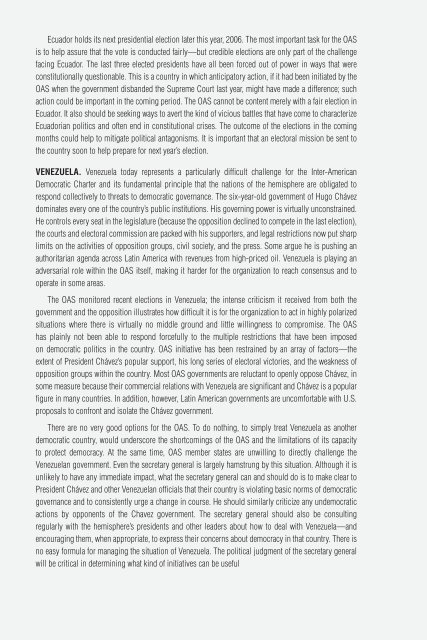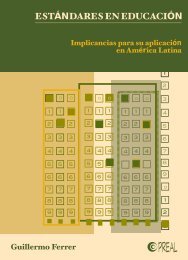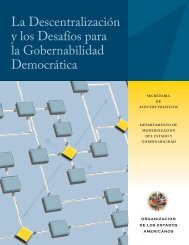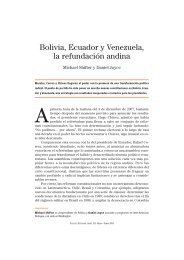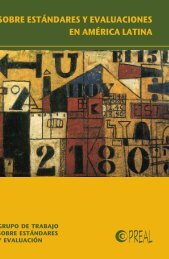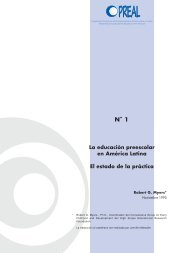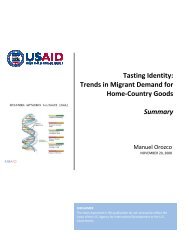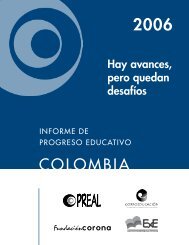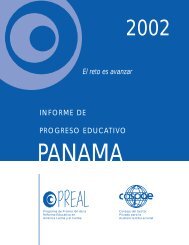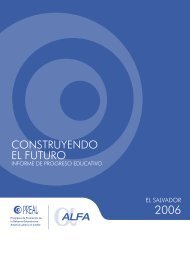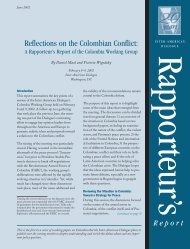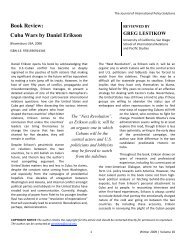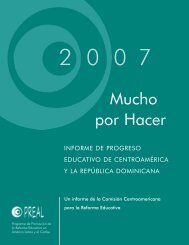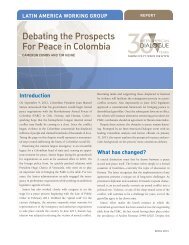View PDF Document - Inter-American Dialogue
View PDF Document - Inter-American Dialogue
View PDF Document - Inter-American Dialogue
You also want an ePaper? Increase the reach of your titles
YUMPU automatically turns print PDFs into web optimized ePapers that Google loves.
Ecuador holds its next presidential election later this year, 2006. The most important task for the OAS<br />
is to help assure that the vote is conducted fairly—but credible elections are only part of the challenge<br />
facing Ecuador. The last three elected presidents have all been forced out of power in ways that were<br />
constitutionally questionable. This is a country in which anticipatory action, if it had been initiated by the<br />
OAS when the government disbanded the Supreme Court last year, might have made a difference; such<br />
action could be important in the coming period. The OAS cannot be content merely with a fair election in<br />
Ecuador. It also should be seeking ways to avert the kind of vicious battles that have come to characterize<br />
Ecuadorian politics and often end in constitutional crises. The outcome of the elections in the coming<br />
months could help to mitigate political antagonisms. It is important that an electoral mission be sent to<br />
the country soon to help prepare for next year’s election.<br />
VENEZUELA. Venezuela today represents a particularly difficult challenge for the <strong>Inter</strong>-<strong>American</strong><br />
Democratic Charter and its fundamental principle that the nations of the hemisphere are obligated to<br />
respond collectively to threats to democratic governance. The six-year-old government of Hugo Chávez<br />
dominates every one of the country’s public institutions. His governing power is virtually unconstrained.<br />
He controls every seat in the legislature (because the opposition declined to compete in the last election),<br />
the courts and electoral commission are packed with his supporters, and legal restrictions now put sharp<br />
limits on the activities of opposition groups, civil society, and the press. Some argue he is pushing an<br />
authoritarian agenda across Latin America with revenues from high-priced oil. Venezuela is playing an<br />
adversarial role within the OAS itself, making it harder for the organization to reach consensus and to<br />
operate in some areas.<br />
The OAS monitored recent elections in Venezuela; the intense criticism it received from both the<br />
government and the opposition illustrates how difficult it is for the organization to act in highly polarized<br />
situations where there is virtually no middle ground and little willingness to compromise. The OAS<br />
has plainly not been able to respond forcefully to the multiple restrictions that have been imposed<br />
on democratic politics in the country. OAS initiative has been restrained by an array of factors—the<br />
extent of President Chávez’s popular support, his long series of electoral victories, and the weakness of<br />
opposition groups within the country. Most OAS governments are reluctant to openly oppose Chávez, in<br />
some measure because their commercial relations with Venezuela are significant and Chávez is a popular<br />
figure in many countries. In addition, however, Latin <strong>American</strong> governments are uncomfortable with U.S.<br />
proposals to confront and isolate the Chávez government.<br />
There are no very good options for the OAS. To do nothing, to simply treat Venezuela as another<br />
democratic country, would underscore the shortcomings of the OAS and the limitations of its capacity<br />
to protect democracy. At the same time, OAS member states are unwilling to directly challenge the<br />
Venezuelan government. Even the secretary general is largely hamstrung by this situation. Although it is<br />
unlikely to have any immediate impact, what the secretary general can and should do is to make clear to<br />
President Chávez and other Venezuelan officials that their country is violating basic norms of democratic<br />
governance and to consistently urge a change in course. He should similarly criticize any undemocratic<br />
actions by opponents of the Chavez government. The secretary general should also be consulting<br />
regularly with the hemisphere’s presidents and other leaders about how to deal with Venezuela—and<br />
encouraging them, when appropriate, to express their concerns about democracy in that country. There is<br />
no easy formula for managing the situation of Venezuela. The political judgment of the secretary general<br />
will be critical in determining what kind of initiatives can be useful


